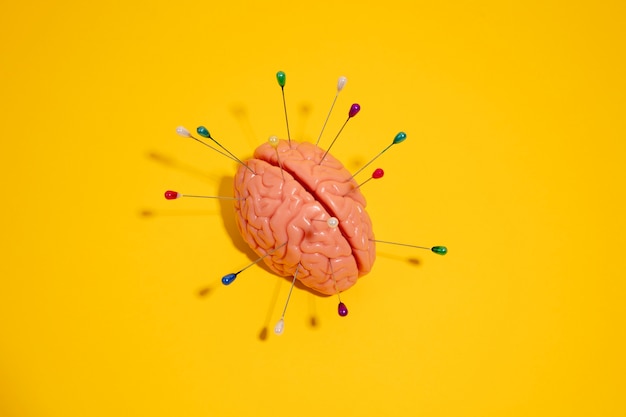
Can Vitamins Help Brain Health?
Throughout life, your brain is constantly forming new connections and repairing damaged ones. Vitamins, minerals, and other nutrients, often referred to as nutraceuticals, play a crucial role in supporting this process.
However, many people don’t get enough of the key vitamins and minerals that are essential for optimal brain health. You might be deficient in certain vitamins or minerals without even realizing it, which can lead to symptoms like low energy, brain fog, and memory loss. The stress of modern life can further deplete the vitamins and minerals you do consume.
To maintain a healthy brain, it’s essential to have these important nutrients. While vitamins and minerals might not make you smarter, they can support brain health, especially if your body is lacking in one or more of them.
The Best Vitamins & Minerals to Support Brain Health
All nutrients contribute to overall health, but some are particularly beneficial for the brain. A healthy diet can provide most of these nutrients, but many people don’t consume a diet rich in colorful and diverse fruits, vegetables, grains, and healthy oils. If your diet is lacking, supplementation becomes more important.
B Vitamins
All eight B vitamins are crucial for brain cell functioning and work best together. Since B vitamins are water-soluble, your body uses them immediately and does not store them, excreting any excess.
B vitamins help produce key neurotransmitters like serotonin, dopamine, and GABA, which are molecules that send messages throughout your brain and body. While B-1 (thiamine), B-2 (riboflavin), and B-6 (pyridoxine) are important for brain health, the most significant B vitamins for brain health are:
Vitamin B12 (Cobalamin)
Without enough B12, your brain doesn’t get enough fuel. Although your brain is only about two percent of your body weight, it uses 20 percent of your body’s energy, and B12 is crucial for energy metabolism.
B12 also helps remove toxins from the brain, specifically homocysteine, an amino acid linked to brain shrinkage and other health issues. A diet high in meat can raise homocysteine levels, which can damage blood vessels in the brain and increase the risk of blood clots. A plant-based diet generally helps reduce clotting and inflammation within blood vessels.
Despite its importance, about 40 percent of the U.S. population has low B12 levels, which can lead to mental and emotional changes like memory loss and brain fog.
Best sources: You can only get vitamin B12 from meat and dairy, although some probiotic bacteria produce it. Vegetarians, vegans, older people, and those with conditions that prevent B12 absorption should take a supplement. Global Healing’s Vitamin B12, a certified organic formula containing the most bioactive forms of this vitamin, is an excellent choice.
Vitamin B-9 (Folate)
Folate is the natural form of B-9 found in foods, while folic acid is the lab-made version. B-9 is essential for producing neurotransmitters in your brain.
A deficiency in folate can lead to neurological disorders and cognitive impairments, affecting both developing fetuses and adults. Low levels of folic acid or folate have been linked to elevated homocysteine levels and Alzheimer’s disease. Getting enough B-9 from food can be challenging.
Best sources: B-9 is found in green leafy vegetables, beans, asparagus, beets, and citrus fruits.
Antioxidant Vitamins
Your brain requires a lot of energy to function and is prone to oxidative stress, which occurs when free radicals damage cells. These free radicals are naturally generated but increase with exposure to toxins and stress.
Vitamins E, C, and D are some of the most important antioxidants for your brain, counteracting the effects of cell-damaging free radicals.
Vitamin E
Vitamin E is highly effective at neutralizing free radicals. It supports the brain’s ability to adapt and form new connections and boosts your immune system.
People with diets rich in vitamin E may be less likely to develop dementia, and it may slow the progression of Alzheimer’s disease. However, 90 percent of Americans do not meet the estimated average requirement for vitamin E.
Best sources: Vitamin E can be found in hazelnuts, green leafy vegetables, asparagus, avocados, olives, spinach, and sunflower seeds.
Vitamin C
Vitamin C is a powerful antioxidant, and low levels have been linked to depression. It helps convert dopamine to norepinephrine, which affects focus, interest, intelligence, and mood.
Vitamin C deficiency is rare, but smokers or those who consume more meat than plant foods might not get enough.
Best sources: Vitamin C-rich foods include citrus fruits, tomatoes, broccoli, bell peppers, leafy greens, and berries, especially strawberries, raspberries, and cranberries.
Vitamin D
Vitamin D is a fat-soluble vitamin crucial for brain health and function. It supports a healthy mood and protects against cognitive decline.
A clear example of its importance is seasonal affective disorder (SAD), where people experience mood changes during months of low sunlight due to reduced vitamin D production.
Best sources: Your skin produces vitamin D from sun exposure, but you may need more during certain times of the year. Shiitake and button mushrooms can help boost your intake. Vegetarians or vegans may need a supplement, as most sources of vitamin D are not plant-based.
Minerals
Dietary minerals are chemical elements essential for bodily functions. The following minerals are particularly important for the brain:
Iron
Iron helps regulate the central nervous system, including the brain, and is used in metabolic processes involving thought and behavior. Iron deficiency is common, especially among women of child-bearing age, pregnant women, vegetarians, and vegans. Low iron levels can cause brain fog and psychiatric symptoms.
Best sources: Iron-rich plant-based foods include legumes like white beans, lentils, and kidney beans, as well as oats and spinach. Sesame seeds and cashews are also high in iron. Iron supplements are available, but many can be harsh on your system. Global Healing’s Iron is a plant-based supplement that is gentle on your stomach.
Lithium
Lithium is a trace mineral that shows promise as a “brain booster.” While found in many foods, lithium orotate is an optimal form found in supplements, combining lithium and orotic acid.
Lithium orotate may increase the brain’s gray matter and is one of the few substances known to stimulate new brain cell growth besides exercise. Small servings of lithium orotate can significantly increase proteins that maintain and repair brain cells, showing potential for improving mood, memory, and cognitive function.
Best sources: Lithium is found in low levels in many foods, including lentils, garbanzo beans, mushrooms, cauliflower, brown rice, and coffee. If you take supplements, purchase them from a reputable supplier. Global Healing’s Lithium Orotate is an excellent choice, promoting brain function and a happy mood with low servings of lithium orotate.
Nutraceuticals
Though not vitamins, nutraceuticals are worth mentioning for their substantial role in cognitive function. Nutraceuticals that help brain health are called nootropics.
Omega-3 Fatty Acids
Omega-3s are the building blocks of neurons and their cell membranes. They also help limit the number of beta-amyloid proteins that develop in the brain with age, which are linked to Alzheimer’s disease and other neurodegenerative diseases.
There are three main types of omega-3s: alpha-linolenic acid (ALA), eicosapentaenoic acid (EPA), and docosahexaenoic acid (DHA). ALA must be obtained from food or supplements, while the body produces DHA and EPA. However, many people don’t get enough omega-3s relative to omega-6 fatty acids, making dietary intake important.
Best sources: Great sources of omega-3 fatty acids include olive oil, flax seeds, chia seeds, algae oil, walnuts, and kiwi fruit. Algae oil is one of the few plant sources of EPA and DHA; other plant sources mainly provide ALA. Avoid fish oil supplements due to the risk of mercury contamination.
Probiotics
Probiotics are beneficial microbes that support digestive health. Healthy gut bacteria play a key role in the communication between the gut and the brain, known as the gut-brain axis. The gut produces up to 90 percent of the body’s serotonin, so nurturing your gut biota is essential for a happy and healthy mind.



